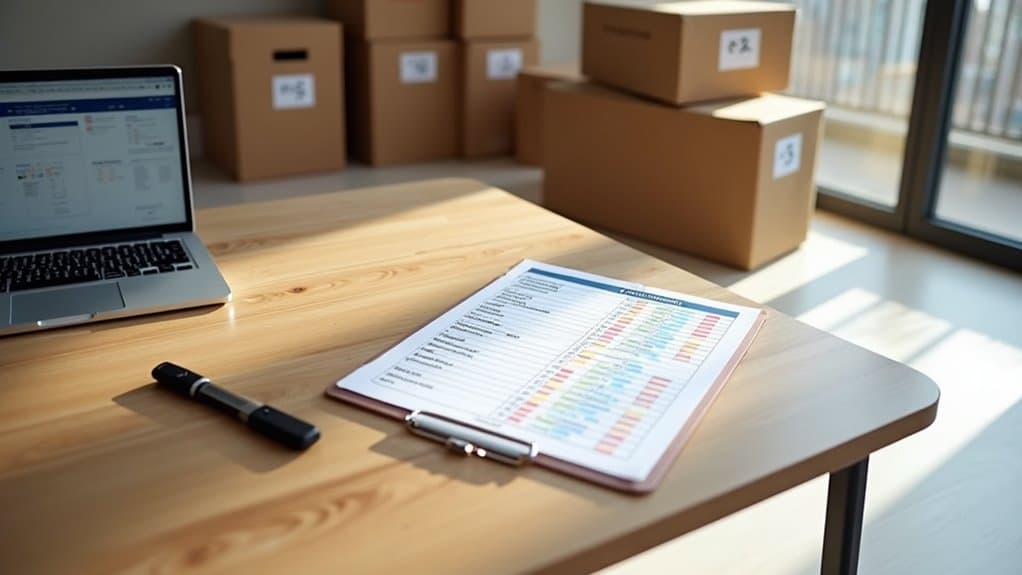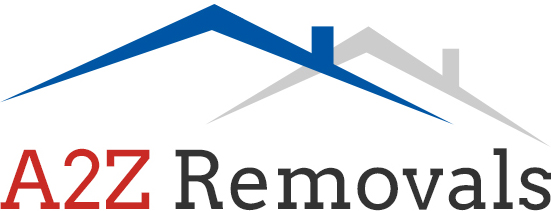
Key Questions to Ask Your Local Removal Company
When selecting a local removal company, it's important to ask the right questions to ensure a smooth move. Start by checking their licensing and insurance to protect your belongings. Ask about the services they provide, such as packing, unpacking, and handling delicate items. Request estimates to understand pricing and any potential extra charges. It's also wise to inquire about the experience and training of their staff to ensure your items are handled safely. Look into their inventory management methods to keep track of your belongings during the move. Lastly, clarify their cancellation policies. By asking these questions, you can feel more confident in your choice of removal company.
Key Takeaways
- Check the company's licensing and insurance to ensure they comply with local regulations and protect your belongings.
- Ask about their packing techniques and materials to keep your items safe during the move.
- Request a detailed quote, including any potential extra charges for services or materials, to avoid surprises.
- Inquire about the experience and training of their staff to ensure a hassle-free moving process.
- Confirm how they manage inventory to track your belongings and handle any lost items during the move.
Licensing and Insurance
When hiring a local removal company, it's crucial to check their licensing and insurance to ensure a hassle-free move.
Start by verifying their licensing. For local movers in the UK, companies should be registered with the relevant authorities and possess the necessary permits to operate. For instance, removal firms in London may need to comply with specific local regulations. Additionally, ensure that the company holds the appropriate A-901 license to operate legally, which is essential for waste transporters in New Jersey. A reputable removal company should also provide proof of licensing to demonstrate compliance.
Next, confirm their insurance coverage. A reputable moving company should have comprehensive insurance to protect your belongings during transit. Look for cargo insurance and public liability insurance to cover any potential damages. It's also important they've employer's liability insurance, which protects against any injuries sustained by their workers while on the job.
Finally, request proof of their insurance and licensing. This ensures the company complies with UK regulations and gives you peace of mind as you prepare for your move.
Services Offered
Understanding the services offered by your local removal company is key to a smooth moving experience. Start by asking about their packing methods; professional firms use quality materials to ensure your belongings are safely packed for transport, safeguarding them and streamlining the moving process. Additionally, many removal companies conduct an initial home visit to provide a cost estimation based on your specific needs. It's important to confirm that they utilize high-quality packing materials to protect your items during the move.
Transport is another vital service. Your removal company should have suitable vehicles for your move, tailored to the size of your belongings.
Once you reach your new home, unpacking services can be a real help, allowing the team to place items in the right rooms and even reassemble furniture or install appliances for you.
Don't forget to inquire about storage options. If you need temporary storage, secure containers can be invaluable.
For those with specific requirements, check if they offer services for fragile items or dismantling large furniture.
Lastly, ask about any post-move support. This can help you get settled in more quickly.
Knowing the full range of services available ensures you choose a removal company that fits your needs, making your move as hassle-free as possible.
Estimates and Quotations

Getting an accurate estimate is crucial to avoid surprises on moving day. Start by arranging in-home estimates, where professionals assess the volume of your belongings and any unique challenges, such as stairs or narrow hallways.
If you're pressed for time, consider virtual estimates via video calls or photo submissions for quick quotes without the need for an in-person visit.
It's wise to obtain multiple onsite estimates to compare costs and services. Pay attention to the type of estimate provided. A binding estimate ensures the price remains fixed on moving day, while a not-to-exceed estimate caps your costs without going above the quoted figure.
Itemised estimates offer a detailed breakdown, helping you understand each aspect of the move. Additionally, ensure the estimates are based on accurate measurements of your belongings, as this will enhance the reliability of the final cost. A thorough understanding of house removal costs can help you budget effectively for your move.
Don't forget to ask about extra fees for packing materials, heavy items, or long carries. Transparency is key; reputable companies should provide clear estimates within a few days and include all necessary components, like labour and transportation costs.
Staff Experience and Training
Once you've received a detailed estimate, it's essential to assess the qualifications and expertise of the team. Staff experience and training are key to ensuring a smooth moving process. Consider how long the team has been in the industry and their relevant job experience. Companies with 5-10 years of service tend to manage complex moves more effectively.
Here's a quick overview to consider:
| Criteria | Importance |
|---|---|
| Years of Service | Vital for managing complex moves |
| Mover Experience | Aids in understanding the demands |
| Industry Knowledge | Familiarity with moving protocols |
| Training Programmes | Ongoing development keeps skills sharp |
| Safety Protocols | Minimises the risk of accidents and damage |
Ask about their training programmes. Are they comprehensive, covering packing techniques and safety measures? Do they offer regular refresher courses? A well-trained team not only understands the job but also stays updated with the latest industry practices. By evaluating their staff qualifications and training, you can ensure your belongings are in capable hands. Additionally, it's crucial to inquire whether the company has implemented safety protocols to minimize the risk of accidents and ensure the safe handling of your items.
Inventory Management

When it comes to inventory management, it's crucial to understand how your local removal company tracks items.
Be sure to ask about their procedures for managing lost items and the tracking systems they employ to ensure everything is accounted for.
For example, some companies use barcodes or QR codes for easy scanning during loading and unloading. Implementing best practices in inventory management can significantly enhance their accuracy and efficiency in tracking your belongings.
Knowing these details can provide you with peace of mind during your move.
Inventory Documentation Methods
Effective inventory documentation methods are crucial for maintaining accurate stock records and ensuring smooth operations during your removal process. By adhering to established documentation standards, you can streamline inventory removals and improve accuracy.
Begin by creating removal documents in your inventory management system. Navigate to Company -> Items -> Inventory Removals and click the "Create Inventory Removal Document" button. In the editor, select the stock you need to remove using the "Select Inventory to Remove" option. Remember to save and close the document to finalise the removal process, ensuring you have a clear record of what's been removed.
Consider employing different removal strategies such as FIFO (First In, First Out), LIFO (Last In, First Out), or FEFO (First Expired, First Out) to optimise your inventory management. Each method has its benefits, so choose one that best suits your operational needs.
Additionally, tracking inventory by lot or serial number can help you differentiate units easily.
Integrating these practices with your inventory management software can automate stock management and minimise human errors. With proper documentation, you'll maintain accurate inventory levels, making your removal process more efficient and reliable.
Handling Lost Items
Lost items can pose a significant challenge for businesses, often resulting from ineffective inventory management. To tackle this issue, it's essential to adopt strategies that prioritise prevention and robust inventory tracking. Here's a concise overview of common causes and practical solutions:
| Cause of Lost Items | Solution |
|---|---|
| Poor inventory management | Conduct regular audits and tracking |
| Employee theft | Implement security measures and clear policies |
| Inaccurate recording | Provide employee training and utilise technology |
| Mishandling of inventory | Use barcode scanning systems |
| Lack of monitoring | Install surveillance cameras |
Tracking Systems Used
To reduce the risk of lost items, it's essential to implement effective tracking systems in inventory management. Speak to your local removal company about the tracking technology they use to ensure your belongings are secure and accounted for.
Look for automated updates that offer real-time inventory access through cloud-based systems, allowing you to check on your items from anywhere.
Ask about barcode scanning capabilities, as this improves tracking efficiency and accuracy. The automatic generation of barcodes for each item can simplify the process significantly.
Additionally, find out if they provide features for uploading photos of inventory items and custom fields for detailed tracking, which can be invaluable in keeping tabs on your possessions.
It's also worth checking whether their systems integrate with moving management software. This integration can enhance communication and reporting, giving you clear visibility of your items' status.
With these tracking systems in place, you can trust that your inventory is managed securely and efficiently, lowering the chances of any items going missing during your move.
Payment Terms
Understanding payment terms is crucial when hiring a local removal company, as it can significantly affect your moving experience. You want to ensure payment security while maintaining flexibility. Be clear about the accepted payment methods—most companies prefer credit cards due to the consumer protection they offer. Also, inquire about payment timing; some may require full payment upfront, while others might allow a deposit with the final balance due on the moving day.
Here's a quick overview of common payment terms:
| Payment Method | Security Level | Negotiation Options |
|---|---|---|
| Credit Cards | High (consumer protection) | Flexible payment schedules |
| Cash | Low (no protection) | Limited negotiation |
| Cheques/Money Orders | Moderate (depends on type) | Possible instalment payments |
Don't hesitate to discuss your payment preferences with the company. Having clear written agreements outlining payment schedules can help prevent any last-minute surprises. Research the company's reputation and look for accreditations to ensure reliability. By understanding these terms, you can make informed decisions that enhance your moving experience.
Cancellation Policies

Before finalising your booking with a local removal company, it's crucial to understand their cancellation policies to avoid unexpected costs. Start by checking their fee structure; cancellation fees can vary significantly and may be a percentage of your total moving cost, so it's important to know this in advance.
Take note of the required cancellation notice. Some companies may only need a few days' notice, while others might ask for several weeks. This notice period directly affects any fees you could incur. If cancellation is necessary, act promptly and get in touch with the company to start the process.
Keep a record of all communications, including your reasons for cancellation. Ask about their refund policies and whether partial refunds are available, as this can help minimise potential losses.
Finally, familiarise yourself with local laws that may influence cancellation policies and your rights as a consumer. Knowing these details will help you avoid unexpected penalties and assist in resolving any disputes that may arise.
Specialty Item Handling
When moving specialty items, it's essential to choose a company experienced in handling fragile and large objects.
Proper packing techniques can significantly protect your valuables during transit. For instance, ask how they secure items like glassware or oversized furniture.
Knowing their methods will provide peace of mind as you plan your move.
Experience With Fragile Items
Choosing a removal company with a strong background in handling fragile items is crucial to ensure your valuable possessions arrive safely. Ask about their experience with fragile packaging and the specific techniques they use for handling these items.
It's important they utilise high-quality packing materials, such as bubble wrap and foam, to safeguard your belongings during transit. Make sure they provide adequate cushioning and padding to absorb shocks and prevent movement inside the boxes. Confirm whether they use layering and double boxing for extra protection.
Labeling is also key. Boxes should be clearly marked with "Fragile" and "Handle with Care." Don't hesitate to inquire about their labelling practices.
Additionally, check if the staff are trained in specialised handling techniques for fragile items. This expertise can make a real difference.
Lastly, discuss insurance coverage to ensure your possessions are protected. By thoroughly assessing their experience with fragile items, you can trust that your valuables will be treated with the utmost care.
Transportation for Large Objects
Transporting large objects requires careful planning and the right resources for a smooth move. When considering a local removal company, ask about their transport logistics and vehicle options. This ensures they've the appropriate fleet for your needs, whether it's bulky furniture or heavy equipment.
Look for companies offering various truck sizes, such as 28-foot enclosed trailers or large pantechnicon lorries. This flexibility helps with transporting items that won't fit in standard vehicles.
Check if they've specialised equipment for heavy items; firms like North American Van Lines and TWO MEN AND A TRUCK have the necessary tools and skilled labour to tackle these challenges.
Also, ensure they've contingency plans for any unexpected issues. Understanding their insurance and liability policies is crucial, as comprehensive coverage provides peace of mind during the move.
Proper Packing Techniques
Proper packing techniques are essential for ensuring the safe transport of delicate items. When packing fragile goods, start with sturdy, heavy-duty boxes that can endure the challenges of moving. Wrap each fragile item individually in bubble wrap or soft packing paper to prevent damage.
It's crucial to fill any gaps in the box with packing peanuts or foam pads to keep everything secure during transit. For added protection, consider double-boxing your most delicate items, allowing at least 3 inches of cushioning between the boxes.
Clearly label all boxes as "Fragile" to alert movers to handle them with care. When loading the van, place fragile boxes last so they can be unloaded first, avoiding the risk of stacking heavy items on top of them.
If you're unsure about handling specialty items like pianos or artwork, hiring professional movers can offer peace of mind. They've the expertise and the right materials to ensure your valuable possessions are properly secured.
Always communicate any specific handling requirements to your movers, so they know how to treat your fragile items during the move.
Tracking and Communication

When preparing for a move, staying updated with tracking and communication is crucial. Be sure to ask your local removal company about their GPS tracking features. This technology allows you to receive real-time updates on the whereabouts of your belongings, helping you estimate arrival times and ensuring the safety of your valuable items.
Effective communication is just as important. Check if they provide email updates or a dedicated platform where you can access detailed information and FAQs about the moving process. This is especially useful if you have team members in different time zones.
Real-time tracking systems not only enhance security but also make your moving experience simpler. You'll appreciate being able to track your move easily and maintain open lines of communication with the removal team.
Before the move, confirm whether they conduct pre-move surveys to discuss logistics and identify items that can't be transported.
Additional Charges
Understanding additional charges is essential for a hassle-free moving experience. You don't want to be surprised by hidden fees that could increase your final bill.
It's crucial to have a clear breakdown of services so you know what to expect. Here are some common additional charges to check for:
- Long carry charges for moving items over considerable distances
- Lift fees for using lifts during the move
- Access surcharges for difficult locations with obstacles
- Heavy or bulky item fees for transporting large furniture
- Stair carry fees for navigating stairs
Also, ask about fees for special services, which may include disconnection fees, charges for dismantling furniture, or extra pickup costs.
Remember to consider other potential expenses such as moving insurance, storage fees, or cancellation fees.
Before you commit, be sure to ask the right questions:
- What specific services are included in the quote?
- Are there any extra fees for special items or services?
- How are long carry charges calculated?
- What're the fees for additional stops?
- Are there any cancellation fees?
Frequently Asked Questions
What Is Your Policy on Rescheduling a Moving Date?
When rescheduling your moving date, be sure to check the company's fees for changes and any flexible options they offer. For instance, if you give them plenty of notice, you might avoid extra charges. Prompt communication also helps make adjustments easier and can save you money in the long run.
Do You Offer Eco-Friendly Packing Materials?
When packing up your belongings, opting for eco-friendly materials shows your commitment to sustainability. Not only will you improve packing efficiency, but you'll also minimise waste, making your move both green and smooth. Let's get started!
How Do You Handle Large or Bulky Furniture?
When dealing with large or bulky furniture, our team employs specialised protective equipment to ensure safety. If needed, we can disassemble furniture, making the move easier and protecting your items during transport. For instance, we might take apart a large wardrobe to fit it through a narrow doorway, ensuring it arrives in perfect condition.
Can You Accommodate Last-Minute Moving Requests?
Picture the clock counting down to your moving day. You can find last-minute availability with emergency services ready to assist. They'll quickly manage your urgent needs, making your move feel smooth, even when time is tight.
What Measures Do You Take for Customer Privacy?
We take customer privacy seriously and prioritise data protection. Your information is handled confidentially, with strong security measures in place to protect your personal data from unauthorised access and potential breaches. For example, we use encryption to secure your data and regularly update our systems to stay ahead of threats. You can trust us to keep your information safe.
Conclusion
Choosing the right removal company can significantly impact your moving experience. In fact, around 30% of people encounter problems with their movers. To avoid joining that group, ask essential questions about their licensing, services, and staff experience. For instance, inquire whether they are a member of a recognised trade association, as this often indicates a commitment to professional standards. By gathering this information, you'll feel more confident about your choice. With the right preparation, your move can be straightforward and hassle-free, making it easier to settle into your new home.


